

A dive bar is probably not the first place one would look to find New York City’s rich history. The following places, however, are not your average bars. As the oldest bars in NYC, most of them were around when the Brooklyn Bridge first opened in 1883. Their walls are covered in history, echoing the ghosts they have acquired over more than a century. They have been characters in a number of movies and books, and are in countless photographs. Their famed patrons range from George Washington to Bob Dylan, as varied as the neighborhoods where they are located, but it’s the neighborhood residents that have breathed life into these watering holes over the last 100+ years.
1. Fraunces Tavern (1762)
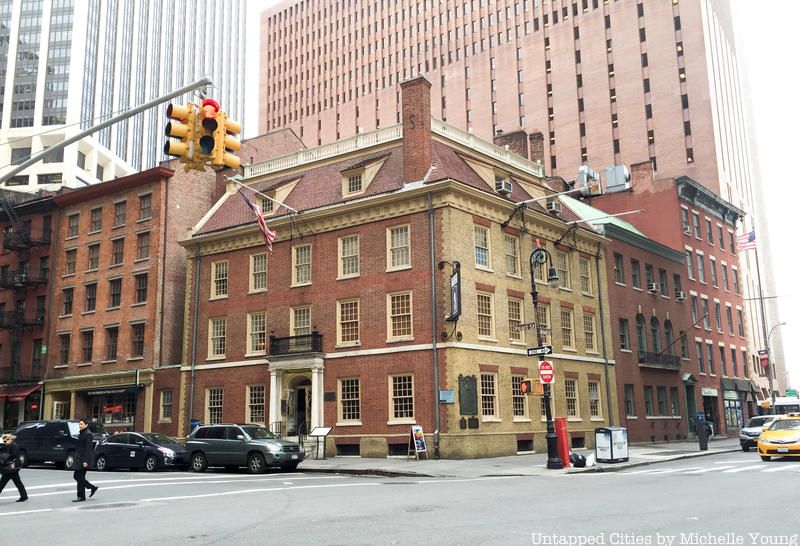
If you are looking for George Washington’s tooth, Fraunces Tavern is the place to be. The building on the corner of Pearl Street and Broad Street in the Financial District was constructed in 1719 in the Georgian style, as a home for the Delancey family. Samuel Fraunces, a revolutionary whose race remains a mystery, turned the yellow brick structure into a tavern called the Queen’s Head. It was a meeting spot for the Sons of Liberty and George Washington gave his farewell speech here on December 4, 1783.
Since 1904 the tavern has been under the ownership of the Sons of the Revolution in the State of New York. Though the many reconstructions it has undergone have attempted to restore the original edifice, several fires in the 19th century made it impossible to know the original building plan. Nowadays Fraunces Tavern multitasks as a museum as well as a functioning restaurant and bar. Aside from being one of the oldest bars in NYC, it holds a spot on the National Register of Historic Places.
2. Ear Inn (1817)
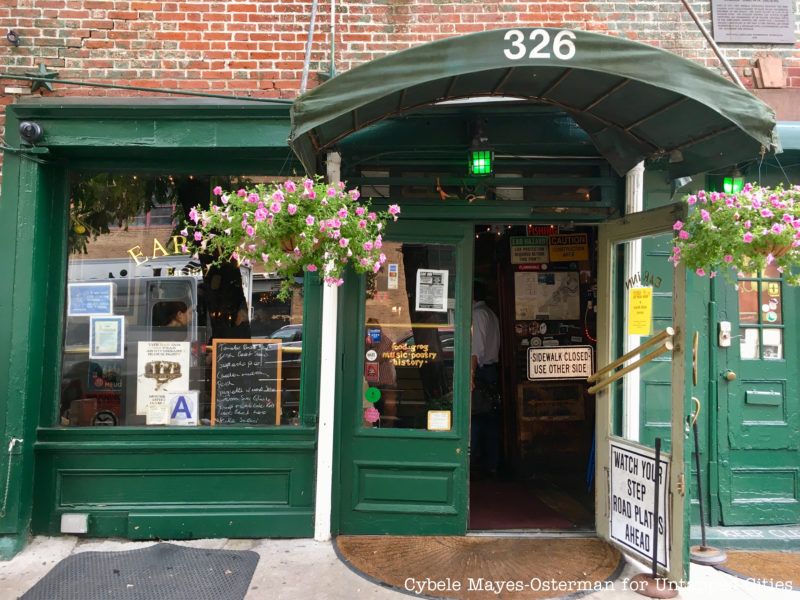
The Ear Inn has been housed by the ground level of a New York City landmark since the early 19th century, when it was a mere five feet from the Hudson River. The James Brown House, built in 1817 in what is now SoHo, was named after an aide to George Washington during the Revolutionary War who built the house after his success as a tobacco trader. It is constructed solely from wood post and Flemish brick.
One of the cheaper bars on this list, the Ear Inn got its name after its 1977 re-opening, prior to which it was known unofficially as “the Green Door.” Due to restrictions placed on changing the signs on a historical landmark, the owners had to paint over parts of the neon B in “BAR” in order to name it after the Ear (a music magazine that was published upstairs).
3. Neir’s Tavern (1829)
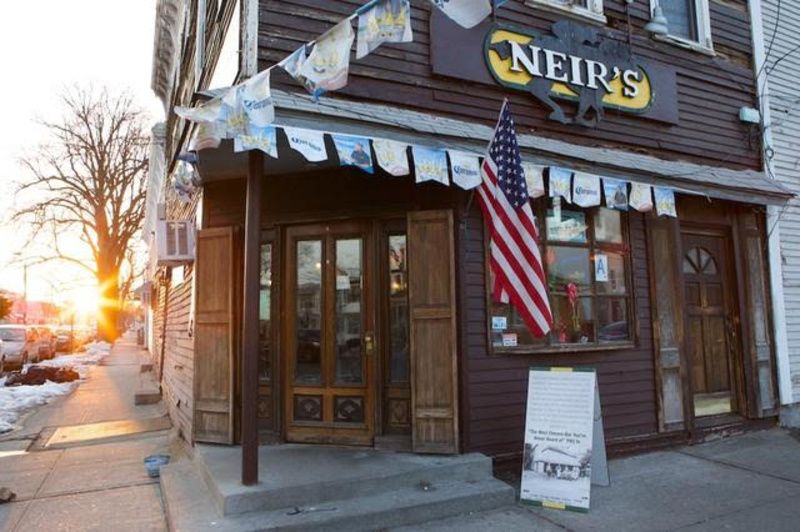
Neir’s Tavern got its start catering to gamblers at the nearby Union Course horse racing track in Woodhaven, Queens. Originally known at its opening in 1829 as the Blue Pump Room, and later as the Old Abbey, it was known as a rough and tumble hangout for the wild crowds that would frequent the races, specializing in rum. The business’ reputation changed drastically in 1898 when it was purchased by its namesake, Louis Neir, who gave it a makeover as a “social hall,” featuring a ballroom, bowling alley, and rooms for rent. While Neir’s name was forgotten when the place was resold again in 1967 and renamed the Union Course Tavern, it received a long due remodeling in 2009, and its previous name of Neir’s was restored.
While Neir’s hasn’t retained the kind of name recognition it had a century ago, it has taken on a new identity in film and TV. It was used in the 2011 action flick Tower Heist, and has been featured in Goodfellas. It’s also a favorite of several starlets: W.C. Fields famously loved the tavern, and it was apparently the spot of Mae West’s first performance.
4. McSorley’s Old Ale House (1854)
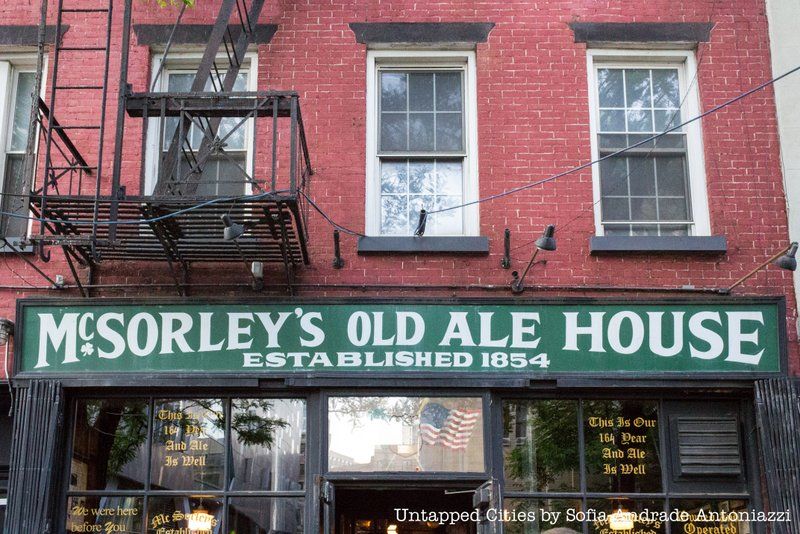
Standing inconspicuously at 15 E. 7th Street, McSorley’s Old Ale House offers two drinks: McSorley’s Dark Ale and McSorley’s Light Ale. Despite the lack of variety, or perhaps because of it, the bar has thrived throughout the years, managing to keep fairly low prices. Collectibles line the walls, some of them there since 1910. Wishbones hang from above placed there by neighborhood boys who went to war and did not make it back.
Though the ale house is declared to go back to the year 1854, records deem it impossible. Whatever year the establishment came to be, it’s certainly one of the oldest bars in NYC and has some of the oldest urinals, dating back to 1911. Famous patrons have included Abraham Lincoln, Teddy Roosevelt, and e.e. cummings, who referred to McSorley’s as “snug and evil” in a 1923 poem. Until 1970 women were not allowed in the bar, an attitude reflected by their former motto “Good Ale, Raw Onions and No Ladies.”
5. Pete’s Tavern (1864)
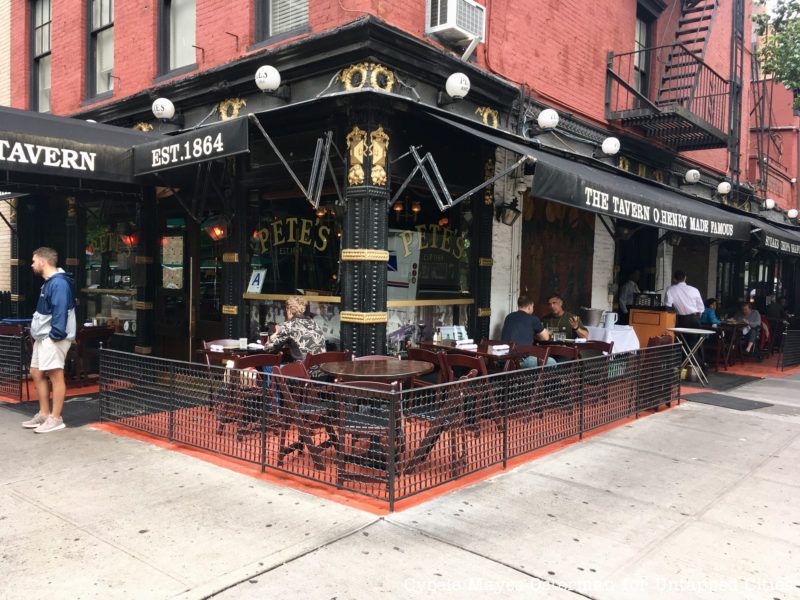
Pete’s, also known as “the tavern that O. Henry made famous,” is a vestige of the Civil War era. The building itself dates back to 1829, though it was not operated as a bar until 1864. Its large signs claiming to be the oldest bar in the city have been greatly disputed by McSorley’s.
As was the case for most of the previous pubs, Prohibition meant business as usual, though its brief status as a flower shop was one of the more creative covers. It lies in the Gramercy Park Historical District, and though it has not been specifically designated as a New York City landmark, it certainly enjoys its status as one of the oldest bars in NYC.

